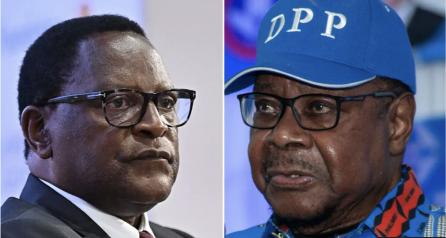Malawi set for high-stakes election as Chakwera and Mutharika clash again

The vote comes after years of economic hardship, devastating natural disasters, and the sudden death of the nation’s vice-president, leaving the political environment charged with uncertainty.
Malawians head to the polls this month in an election that has become a defining test for the country’s fragile democracy.
The vote comes after years of economic hardship, devastating natural disasters, and the sudden death of the nation’s vice-president, leaving the political environment charged with uncertainty.
Seventeen candidates are vying for the presidency, but the contest has largely narrowed to President Lazarus Chakwera of the Malawi Congress Party (MCP) and his long-time rival Peter Mutharika of the Democratic Progressive Party (DPP).
The two men, who have battled each other in every election since 2014, are once again the clear frontrunners.
This marks the fourth time they meet at the ballot. Mutharika first beat Chakwera in 2014. He was also declared the winner in 2019, but that election was annulled by the Constitutional Court over widespread irregularities, forcing a re-run that Chakwera won the following year.
The key contenders
Chakwera, a 70-year-old former theology lecturer and preacher, has led Malawi since 2020. His presidency has been overshadowed by soaring inflation, fuel shortages, and corruption scandals. Still, his administration has scored achievements such as reviving train services for the first time in more than 30 years and expanding major road projects.
Mutharika, 85, a retired lawyer and brother of the late president Bingu wa Mutharika, governed between 2014 and 2020. Like his rival, his name has been tied to graft allegations, which he denies. His supporters argue that today’s inflation rate of about 27% shows that he managed the economy more effectively than Chakwera. Questions around his health and age, however, hang over his campaign, as he has made few public appearances.
Other notable candidates include former president Joyce Banda of the People’s Party, Vice-President Michael Usi of Odya Zake Alibe Mlandu, and former central bank governor Dalitso Kabambe of the UTM.
Issues shaping the vote
Economy: Malawi remains one of the poorest nations in the world and has recently been hit hard by external shocks. Cyclone Freddy in 2023 killed hundreds, followed by a severe drought in 2024 that sent food prices soaring.
The country faces acute shortages of foreign currency, persistent power outages, and a weakened currency after forced devaluations.
Corruption: Chakwera pledged to “clear the rubble of corruption” on taking office, but critics say he has failed to deliver.
Suspicion deepened when corruption charges against high-profile figures were dropped last year, and the Anti-Corruption Bureau has lacked a permanent director for more than a year. Past governments also struggled with graft, with both Banda and Mutharika facing accusations during their tenures.
Leadership vacuum: The 2024 plane crash that killed Vice-President Saulos Chilima left a significant gap in Malawi’s political scene.
Seen as a popular figure among the youth and once a potential presidential challenger, his death has cast a shadow over the campaign. Opposition groups have raised questions about the official probe, despite investigations finding no evidence of foul play.
Election process and credibility
Since the annulled 2019 election, Malawi has adopted a new system requiring a candidate to secure more than 50% of votes to win outright.
Analysts suggest the upcoming race could lead to a run-off if no candidate achieves this threshold in the first round. Both the MCP and DPP are expected to court smaller parties in that scenario.
Although the 2019 court ruling strengthened confidence in Malawi’s electoral system, concerns remain.
Civil society groups and opposition parties accuse the electoral commission of favouring the ruling party, allegations the body has rejected.
Reports of politically motivated violence, including a machete attack on protesters in June, have raised fears over voter intimidation and shrinking space for dissent.
Timeline of results
The commission is expected to announce presidential results by September 24, while parliamentary results will be declared by September 30.
